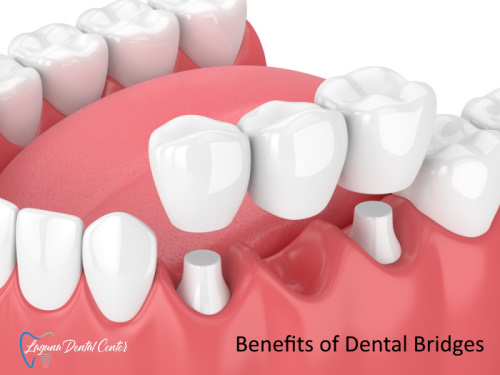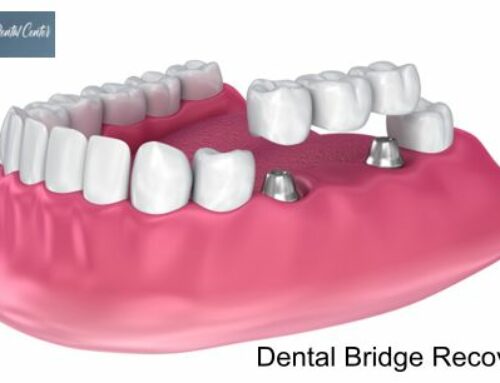Table of Contents

What are the benefits of dental bridges?
Dental bridges use one or more prosthetic teeth to bridge the gap left by lost teeth. For your teeth to operate properly and to avoid major dental problems, missing teeth should be replaced.
1. Prevents shifting of teeth
Dental bridges are effective in preventing teeth from shifting in the mouth, as they replace missing teeth and keep surrounding teeth in line. This helps maintain proper teeth alignment and prevents serious dental issues. Dental bridges are an excellent option for restoring your smile and improving your oral health.
2. Enhances your appearance
Dental bridges enhance appearance and confidence by replacing missing teeth, which can improve the look of your smile and face. Missing teeth can cause bone loss, making facial muscles sink in, but dental bridges can prevent this issue by supporting facial muscles. Dental bridges are a reliable solution for those seeking to restore their smile and improve their overall appearance.
3. Durability
Dental bridges can last anywhere from 8 to 10 years depending on if they are properly taken care of. There are some cases of dental bridges lasting up to 30 years.
Porcelain or ceramic artificial teeth used for dental bridges are highly durable and can easily handle daily tasks.
4. Convenience
Dental bridges don’t require removal and have the same care procedures as natural teeth, making them low maintenance.
5. Less Eating Restrictions
Replace missing tooth with a dental bridges allow you to eat most foods without the risk of dislodging or damaging the restoration, unlike dentures. After the bridge is fully healed, you can enjoy eating apples, carrots, nuts, and popcorn regularly, just like with natural teeth.
Dental Bridges have many benefits other than replacing missing teeth. Learn more about its advantages.
What are the drawbacks of dental bridges?
Some drawbacks of having Dental Bridges are listed below.
- Dental bridges that are poorly fitted can cause tooth decay to develop beneath the bridge. However, if there is no dental bridge in place, teeth may shift, resulting in a crooked smile.
- Weak surrounding teeth may cause the dental bridge to collapse. When visiting the dentist, it’s crucial to ensure that the surrounding teeth have the necessary strength to support the restoration.
- Some dental bridges may require crowns to be placed over healthy teeth. However, if a dental bridge isn’t installed, a gap may appear in your smile, potentially leading to more severe dental issues.
How does a dental bridge restore missing teeth?
A dental bridge can effectively fill one or more gaps in your smile caused by missing teeth with artificial teeth. Typically, the bridge consists of crowns that are cemented onto each side of the gap, providing support for the replacement tooth/teeth.
Losing a tooth can have a significant impact on your facial structure and can lead to weakened bones and drooping muscles over time. Replacing the missing tooth is essential to maintain the proper alignment of your teeth, ensuring your oral health and preventing significant changes in your facial features. Learn more about Dental Bridges recovery and aftercare.
Is getting a dental bridge worth it?
Yes, dental bridges can prevent sagging of the face caused by tooth loss. Moreover, bridges can effectively maintain the alignment of surrounding teeth and prevent them from shifting out of position in the mouth.
Do dental bridges feel natural?
Initially, there may be some discomfort and soreness when adjusting to a new dental bridge. However, after about two weeks, the bridge should feel as natural and comfortable as your own teeth. This adjustment period is normal, and the end result is worth the temporary discomfort.
Are dental bridges natural looking?
Yes. Dental bridges consist of multiple teeth that are fused together into a single unit. Porcelain is a common material used due to its durability and similarity to natural tooth enamel. Bridges can effectively restore the shape of teeth and are often indistinguishable from natural teeth.
Can you chew on a dental bridge?
It’s normal to experience pain or chewing difficulties after getting a dental bridge. However, if the pain or issues persist for over a week, it may signal an infection or an ill-fitting bridge. That being said, a well-fitted dental bridge usually allows individuals to enjoy their favorite foods without any difficulty or noticeable changes.
Do dental bridges break easily?
No. It is a myth that dental bridges fall out easily. While bridges may become loose over time, your dentist can easily tighten them. Bridges are made to last a lifetime and the likelihood of them breaking or collapsing is rare.
What else to know about Dental Bridges besides its benefits?
Dental bridges are prosthetic devices used to replace missing teeth, but there is more to know about them beyond their benefits. Dental bridges come in different types, require good oral hygiene, and may need periodic adjustments. Additionally, they can improve speech and prevent shifting of surrounding teeth. One of the most common reasons to Replace missing tooth with a dental bridge is to restore the ability to chew and speak properly, as well as to maintain the natural shape and alignment of the remaining teeth. However, it’s important to note that dental bridges cost without insurance can vary depending on the type of bridge, materials used, and the complexity of the case.
Are you a candidate for dental bridge treatment? Don’t waste any time and call Dr. Ronald Ayzin at Laguna Dental Center to schedule an appointment.


